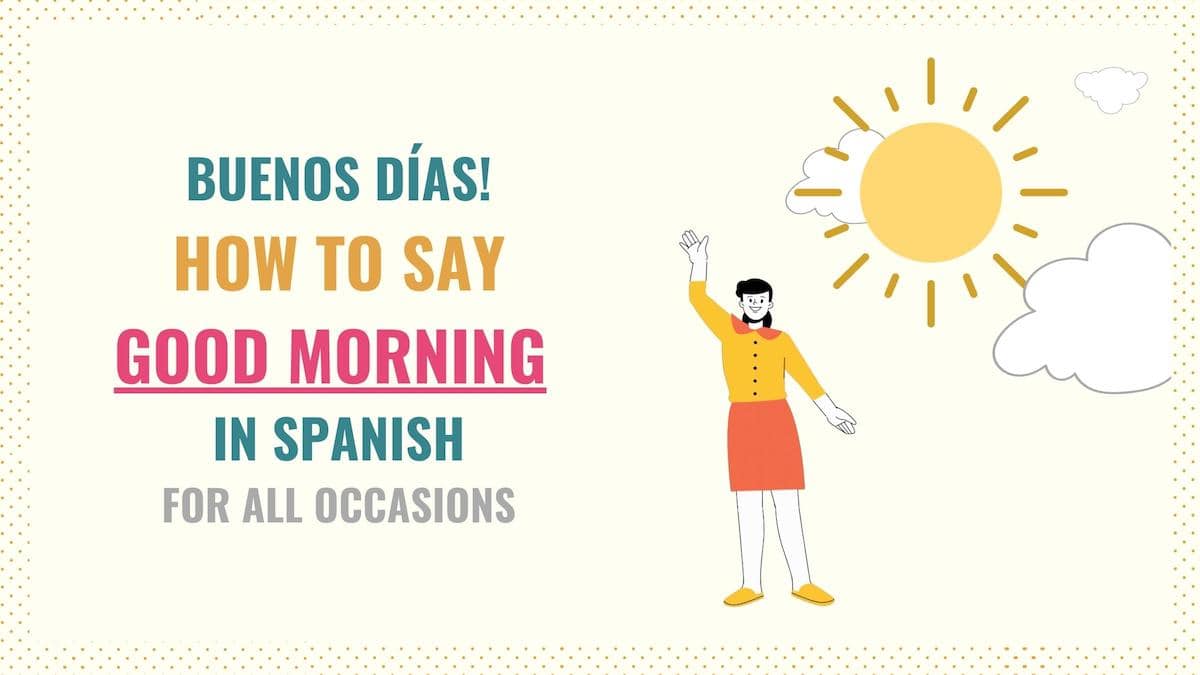Since it’s one of the most basic greetings, many people wonder how to say good morning in Spanish. So, to help you sound more natural, in this article, you’ll find common expressions native speakers use in this context.
I’ve included descriptions and some examples so you can check how to apply this vocabulary.
1. Buenos días
Buenos días is the most common way to say good morning in Spanish. This phrase can be used in both formal and informal settings. As a result, you may customize it depending on who you’re addressing.
Buenos días + [complement]
Buenos días a todos.
Good morning, everyone.
Buenos días, hermosa, ¿cómo estás?
Good morning, beautiful; how are you?
Take Note: There are many terms you can use to call a woman beautiful in Spanish, and that will help you customize your morning greetings.
2. Buen día
In Spanish, buen día is a common variation of ‘buenos días’. Buen día means ‘morning’ or ‘good day’ and can also be used in various contexts.
Buen día + [complement]
Buen día, cariño.
Morning, sunshine.
Buen día, ¿en qué pasillo puedo encontrar los lácteos?
Good day. In what aisle can I find the dairy?
Take Note: Buen día can be used as a morning greeting, farewell, or as a way to wish someone a good day in Spanish.
3. ¿Cómo amaneciste?
In Spanish, ¿cómo amaneciste? is a common and personal way to say good morning. As a result, this expression is more suitable for friends and family. This greeting is only used in the mornings to ask people how they slept and it’s close in meaning to ‘how did you sleep?’ and ‘how are you this morning?’.
Notice that you can change the conjugation of the verb to address a group of people instead:
¿Cómo amaneciste + [complement]?
¿Cómo amaneciste, mi amor?
How did you sleep, my love?
Buenos días, niños, ¿cómo amanecieron?
Good morning, kids; how are you this morning?
If you need to customize this expression to address another person, you must always use the preterite tense.
Take Note: ¿Cómo dormiste? is a common variation you can use instead of ‘¿cómo amaneciste?’. If you need to change the conjugation of this verb, keep in mind that dormir is a verb with stem changes.
4. Hola
As the direct translation of ‘hello’ or ‘hi’, hola is a casual greeting you can use as an alternative to say good morning to your friends or partner.
Hola + [complement]
Hola, guapo, ¿cómo estás?
Hello, handsome, how are you?
Hola a todos, ¿cómo estuvo su fin de semana?
Hi everyone, how was your weekend?
5. ¿Cómo va tu mañana?
¿Cómo va tu mañana? can be used to ask someone how their morning has been, but also as a morning greeting. This expression directly translates to ‘how is your morning going?’.
¿Cómo va + tu + mañana + + [complement]?
¿Cómo va tu mañana, hermosa?
How is your morning going, beautiful?
¿Cómo va tu mañana, corazón?
How is your morning going, love?
Take Note: ¿Cómo va tu mañana? is conjugated to address someone informally. To transform this expression to formal Spanish, you simply need to replace tu with the possessive adjective for ‘usted’.
¿Cómo va su mañana, señorita?
How is your morning going, miss?
6. ¡Arriba!
Spanish speakers use the interjection ¡arriba! as a way to say good morning while waking someone up. This expression is close to ‘rise and shine’ or ‘time to get up’.
¡Arriba, niños! Se les va a hacer tarde.
Rise and shine, kids! You’re going to be late.
Take Note: If you’re trying to wake someone up, you can use the expressions ‘ya es hora’ (it’s time) or despierta, dormilón (wake up, sleepyhead)
7. Buenas
In the context of greetings, buenas is an informal word people use to say good morning to others in Spanish. Although you can use it with strangers, this term is only suitable for casual settings. Buenas means ‘hi’ or ‘morning’.
Buenas, Carlos, ¿cómo estás?
Hi, Carlos, how are you?
Buenas, buenas, ¿todo bien?
Morning, morning, everything okay?
8. Que tengas una excelente mañana
Que tengas una excelente mañana is a more formal expression that Spanish speakers use to wish someone to have an excellent/great morning. This phrase is usually applied as a farewell.
Bueno, que tengas una excelente mañana.
Well, have a great morning.
¡Muchas gracias! ¡Que tengan una excelente mañana!
Thank you very much! Have an excellent morning!
Take Note: Notice that you can use the subjunctive conjugations of tener to wish people to have a good day. You simply need to choose the right conjugation for the person you’re addressing.
Wrapping Up
Being able to say good morning in Spanish will not only help you sound more natural, but it will also open the door to a conversation. So, don’t be afraid to start using these morning greetings! ¡Buena suerte!



